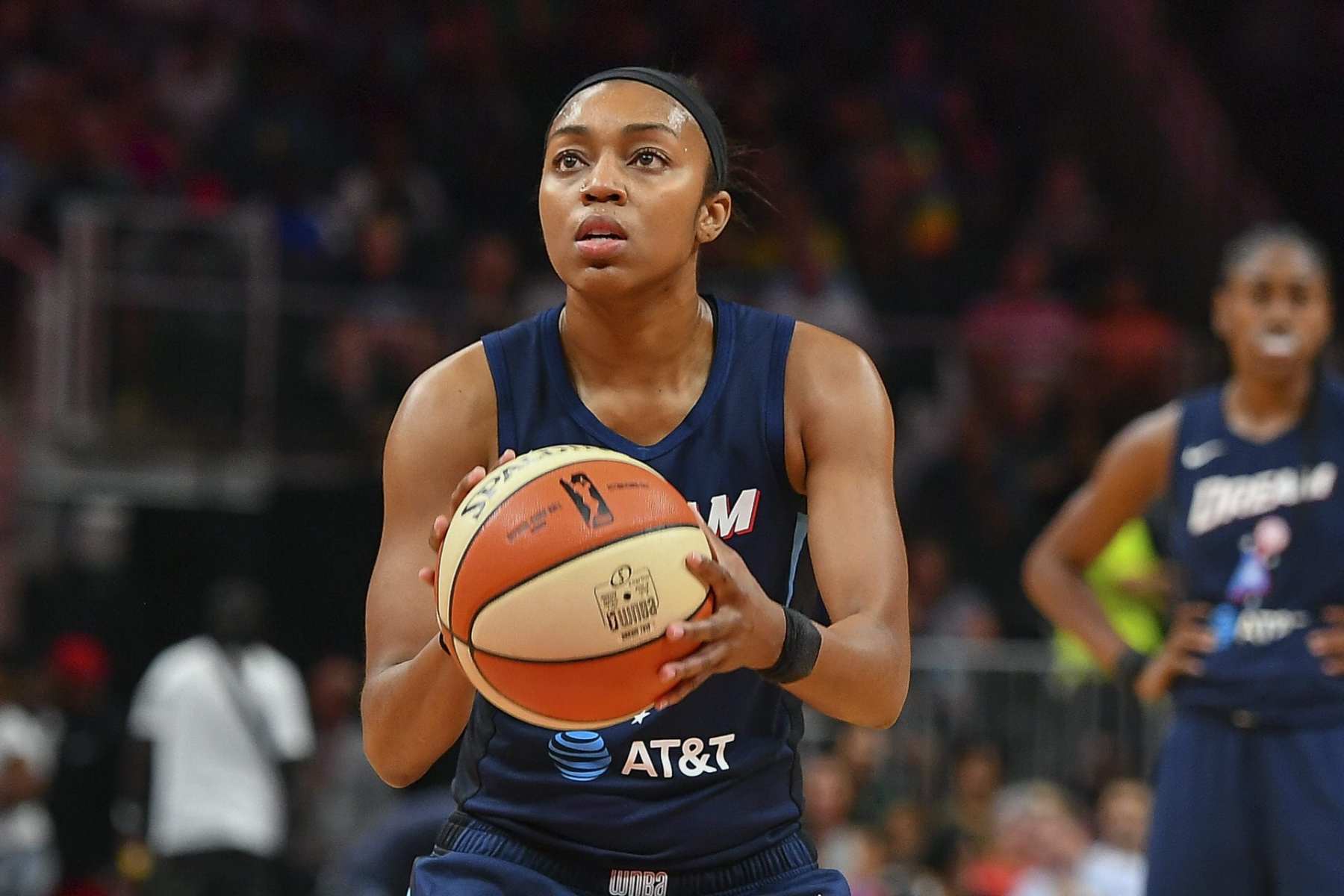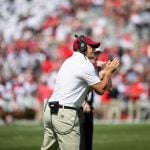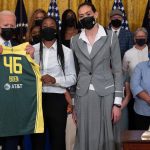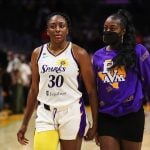The national reckoning on race sparked by the police killing of George Floyd exploded into American sports this week. Basketball and baseball players used their platforms to protest the shooting of Jacob Blake, a 29-year-old Kenosha, Wisconsin, man who was hit by police seven times in the back on Monday. His case has prompted protests and rioting in the city for several days.
But the activism on display on the court and on the field is nothing new for many women in sports — including players in the WNBA, which has dedicated its season to social justice. “Black Lives Matter” is printed on all WNBA courts. Players have pledged to wear the name of Breonna Taylor, the 26-year-old killed in March when Louisville police served a no-knock warrant on her apartment, until the officers in her shooting are arrested.
To discuss the intersection of race, gender, politics and sports, The 19th spoke with Atlanta Dream guard Renee Montgomery, who announced in June that she would opt out of playing in the 2020-2021 season amid the racial reckoning.
This conversation has been edited for length and clarity.
The 19th: You are someone people know as an athlete in the WNBA, a league that is dedicating its season to social justice. What does that mean to you, that the league is doing this, and why didn’t it resonate the same way that, say, the NBA player strike this week resonated? Is gender a factor there?
Montgomery: I think the WNBA has gotten more coverage than it ever has. The WNBA has more games on TV than it ever has, Twitter picked up some games. And I think people are really starting to get to know the WNBA. You know, it sounds crazy, but a lot of people are just not familiar with the players of the WNBA and what the WNBA is all about — because if they were, they’d know that this is not a new thing, WNBA players standing up for a cause.
In 2016, I was a part of the Minnesota Lynx team that had shirts that said, “Change Starts With Us.” We had a police shield on the back just so that the police officers wouldn’t be offended and understand that it’s about justice in America. And even still having done that, the Minnesota Police Department said they would no longer be security at our games, they walked out on us. So we know what it was like to stand up, even against public opinion.
Confronting inequality, generally speaking, is not a new issue for this league. I feel like so much of that is because so many of you sit at the intersection of race and gender.
We’re women that are looked at as leaders in this space. We’re very outspoken about it, we’re very, very mobilized with what we say, what we do. People understand that we’re fighting for a cause, and that helps people join in, because they know we’re fighting the same causes that affect them. We’re just at the forefront of it. So is this a proud moment for me? Like I love wearing that badge of a warrior for people. That’s exciting to me.
The WNBA is among the folks using their platform to keep Breonna Taylor’s case on the radar for people in a way that, frankly, has some of the male players following your lead, putting her name on the backs of your jerseys.
It’s powerful that a whole league would put the name of a sister that’s fallen [on their backs]. None of us had met her before, and it doesn’t matter. That’s what we’re trying to get the point across to a lot of people in America: Even if the issues don’t directly affect you, or it never affects you, it’s still your problem. We need to understand that we all have to be a part of shifting the culture. They’re gonna keep that message clear and present so that you can’t forget.
Do you remember where you were and how you found out about Breonna’s case, and how you felt hearing about what happened to her?
I remember thinking, ‘Wait, I must be missing something. Why are the cops not arrested yet?’ I’m still having the same question. I love to see that Breonna’s Law came into effect in some cities, but why aren’t the cops arrested yet?
Were you surprised at what felt like the tipping or inflection point this week, where you had players walking off the court and walking off the field? Talk to me about what that frustration is, as an athlete: When you have folks telling you to “stick to sports” and not get involved in these issues or suggesting that you should be grateful for your position instead of being outspoken, as if inequality doesn’t affect you.
People want to always split the athlete into multiple pieces. They want the athlete to be their favorite athlete. They don’t want their athlete to talk about social causes. Even if I am a Black woman playing in the WNBA, they just want me to be the WNBA player.
And that’s what athletes struggle with. Because we are one person, we’re not that robot that some people want us to be, to run up and down the court, to not have an opinion, to want us to just keep our head down and play sports. That’s not a realistic ask, because we go and we play sports for a certain amount of time of the day — and even during that time I’m a Black woman — but definitely when I leave, I’m the same as everyone else. We’re all in the same boat.
I think people think that athletes are exempt, or don’t feel that same pressure. But now when they see athletes crying on TV, athletes like LeBron James saying he’s afraid, he’s scared … People can’t understand that because they can’t understand that we’re all a part of our culture. We’re a part of our family dynamic. We all have cousins, nephews, a son that we’re afraid for. We don’t know what to do.
What was your reaction to seeing kind of some of the emotion that was on display from these athletes this week?
I thought, it’s gonna be a very pivotal moment in sports. Because, as I said before, athletes are looked at as almost superhuman, as superheroes, like we can’t be broken, can’t be affected. And then you see a lot of these athletes talking about their feelings. You see athletes, emotional and talking from a vulnerable place. And I think if nothing else, the mental health stigma that’s involved with an athlete and athletic world — I really do think that the athlete is a little more humanized now.
You’re also involved in voting rights. What are the efforts you’re involved in, and why is this a priority for you?
I opted out on June 18, and then right after that, LeBron James’ team hit me up and asked me if I wanted to be a part of the “More than a Vote” campaign. And that was huge for me, because when I opted out, I didn’t know what direction to go in. And you know, there’s a lot of places in our society that need to be fixed: the health system, the prison system, police brutality, the education system. I didn’t know where I wanted to go.
Me being in Atlanta, with voter suppression, we’re a repeat offender here. Our last election we had nine hours plus [wait times]. That’s crazy. Nobody can dedicate a whole day just to go vote. I was happy to be a part of the “More Than A Vote” campaign, and I started my own, called Remember the Third of November, where we’re trying to connect people to politics and not tell people who to vote for. But if you know what your mayor does, your governor does, and you know how much that will affect your community life, then I think that you would have more of a say.
What was your relationship to voting prior to you getting involved in these initiatives? Are you somebody who votes regularly? Did you register to vote when you turned 18?
Oh, yeah. It wasn’t an option in my house. My parents registered me. It was at our local elementary school. I had my first voting experience voting for President Obama. I think, for me, that there was no better way to enter into the voting world, because if you recall that “Yes, We Can” slogan and everybody’s excitement around having the first Black president … That was a fun time to be a first-time voter. That was an amazing feeling.
And that’s why I want people to understand when you might have a heartbreak, the next year, you should recruit 10 more people to make sure that they have their voices heard. Convert! That’s how I want people to see it, like it’s a competition. You didn’t win last time, get back on the horse next time. Don’t give them, “Well, I voted, it didn’t matter anyway.” That’s not the mentality.
That’s such an interesting approach. Of course you would think about it competitively as an athlete, but politics is competitive, right?
Probably the most cutthroat, competitive sport there is!
Let me ask you about your decision to opt out this year. Talk about how you came to that decision and how you plan to spend your time.
The main reason I opted out is because there was a string of tragedies. Before, we used to say things about what our parents had to deal with, and we were thinking, “How could they deal with that?” So just putting that timeline in perspective … I started to see that while we’ve made so much progress, there’s still a lot to be done and in this moment, and that actually brought me to where I am today.
We just launched Moments Equal Momentum. This topic that keeps making the world stop, making athletes boycott, is about police brutality that at its very core, is made to tear down the Black community. I started to think, “OK, I can’t fix police brutality overnight, but what can I do?” And I thought, well, let me try to build up the Black community.
That’s why I’m raising $3 million to save Morris Brown College, an HBCU here in Atlanta and get them back to their accredited, thriving self. That’s my goal. A lot of people may not see the connection, but there’s a lot of breaking down of the community happening right now, so I just wanted to be a part of the rebuild.
When I opted out, everyone was asking me, “Well, how will you know it was worth it?” I was already thinking it’s worth it, but I realized that a lot of people need something tied to an action to make them see the value in it. So this will be my championship, for people that need an action item.





